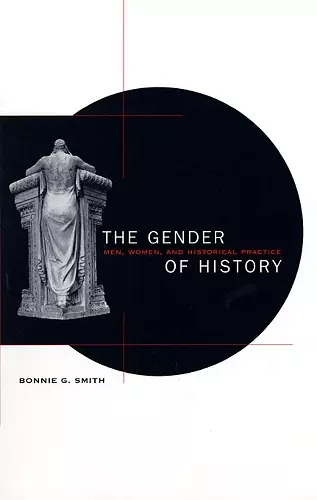The Gender of History
Men, Women, and Historical Practice
Format:Paperback
Publisher:Harvard University Press
Currently unavailable, and unfortunately no date known when it will be back

An elegant, gripping, and provocative book that is likely to change in important ways our view of the development of nineteenth- and twentieth-century historical thought and practice. -- Allan Megill Bonnie Smith's book raises to a new level the debate about gender in historical writing. Ranging across many countries and languages, delving into the personal and professional lives of historians, both professionals and amateurs, men and women, she develops new and original positions on the workings of gender that will excite discussion, controversy, and further research for years to come. -- Lynn Hunt
In this study of the gendering of the practice of history, Smith resurrects amateur history written by women in the 19th century—a type of history condemned as trivial by “scientific” male historians. She demonstrates the degree to which the profession defined itself in opposition to amateurism, femininity, and alternative ways of writing history.
In this pathbreaking study of the gendering of the practices of history, Bonnie Smith resurrects the amateur history written by women in the nineteenth century--a type of history condemned as trivial by "scientific" male historians. She demonstrates the degree to which the profession defined itself in opposition to amateurism, femininity, and alternative ways of writing history. The male historians of the archive and the seminar claimed to be searching for "genderless universal truth," which in reality prioritized men's history over women's, white history over nonwhite, and the political history of Western governments over any other. Meanwhile, women amateurs wrote vivid histories of queens and accomplished women, of manners and mores, and of everyday life.
Following the profession up to 1940, The Gender of History traces the emergence of a renewed interest in social and cultural history which had been demeaned in the nineteenth century, when professional historians viewed themselves as supermen who could see through the surface of events to invisible meanings and motives. But Smith doesn't let late twentieth-century historians off the hook. She demonstrates how, even today, the practice of history is propelled by fantasies of power in which researchers imagine themselves as heroic rescuers of the inarticulate lower classes. The professionals' legacy is still with us, as Smith's extraordinary work proves.
It is the continuing evolution and mutation of postmodernist feminist history, and thus history itself, that we are now witnessing...The Gender of History is a useful introduction to this new mode of history...It is also ingenious enough to compel attention and, sometimes, admiration, as a sheer exercise of mind and fancy...Smith here undertakes to rescue, from the condescension of professional history, the thousands of women "amateurs" who, from the end of the eighteenth century and throughout the nineteenth, plied their trade, writing about such "trivial", "superficial", "inferior" subjects (in the opinion of men) as queens and ladies-in-waiting, travel, culture and social life. -- Gertrude Himmelfarb * Times Literary Supplement *
Smith's groundbreaking research expertly illuminates sexism in the evolution of Western historiography. She documents how in the 19th century women historians were denied access to archives and inadequately compensated for their work...Women's writings were deemed amateurish and unscientific, yet Smith shows how men shamelessly borrowed women's ideas without proper acknowledgment for use in their "professional" endeavors...Highly recommended for academic collections. -- Kim Baxter * Library Journal *
The Gender of History should be required reading for every student of history, undergraduate and graduate. And it should be welcomed by readers beyond the academy. It provokes, it informs, it shocks, it enlightens. It is a tour de force. It will be a classic. -- Mary Kelley * Dartmouth College *
An elegant, gripping, and provocative book that is likely to change in important ways our view of the development of nineteenth- and twentieth-century historical thought and practice. -- Allan Megill
Bonnie Smith's book raises to a new level the debate about gender in historical writing. Ranging across many countries and languages, delving into the personal and professional lives of historians, both professionals and amateurs, men and women, she develops new and original positions on the workings of gender that will excite discussion, controversy, and further research for years to come. -- Lynn Hunt
Careful readers of this book, even the considerable number who will find much to argue with, will find themselves questioning things they have hitherto taken for granted. This is an admirable achievement
But when all is said, the questions Smith raises
are all worth careful examination and serious discussion on the part of those who are willing to entertain disturbing ideas. -- Anne Firor Scott * The Journal of American History *
Bonnie Smith has integrated her own research of years, and that of others, into a fascinating and daring monograph which sheds light on the historical practice in Western society between 1800 to 1940. Smith explores the hypothesis that professionalism in historiography is based on discredited voices and devalued narratives
Instead of facts and knowledge, many historians were focused on bridging a gulf, on healing painful wounds that came from suffering and death. In two breathtaking chapters Smith shows the remarkable historiographical position of women writers in this period. -- Maria Grever * Journal of World History *
The assumption that most of the history written in the last two centuries has been written by and about men depends, Smith argues, on the assumption that the only history worth talking about is "professional" history
Those women who, in the late nineteenth century, attempted to write as professional historians were, Smith argues, caught between two paradigms: the feminized amateur and the masculine professional
This is an unsettling account of the history of our profession, one which raises as many questions as it sets out to answer. The questions it raises remain crucial, however, not only to history's past but also to its future. -- Joy Dixon * Left History *
ISBN: 9780674002043
Dimensions: unknown
Weight: 454g
320 pages